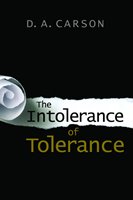A brief book summary from Books At a Glance
About the Author
D. A. Carson is research professor of New Testament at Trinity Evangelical Divinity School, Deerfield, Illinois. He has written or edited more than fifty other books, including The Gagging of God: Christianity Confronts Pluralism, Becoming Conversant with the Emerging Church, and Christ and Culture Revisited.
Introduction
In this book D. A. Carson examines the changing face of tolerance in society. He demonstrates that in contemporary society, tolerance has become something vastly different from what it used to be in the Western world. Using a variety of examples, data, and rational analysis, Carson argues that the new tolerance is not only intolerant, it is totalitarian in both its assumed supremacy and its enforcement. The contemporary concept is incoherent and is applied in ways that are entirely inconsistent and contradictory.
Christians cannot accept the parameters laid down under the reign of the new tolerance. They can encourage and support the rights of everyone to articulate their religious beliefs, they can be kind and courteous in discussions, but they cannot submit to privatizing their beliefs and being silent in the public square. Issues of rights and freedoms are tied to moral frameworks, and the new tolerance is tied to secular relativism. When Christians advocate objective truth and genuine morality, they are labeled intolerant and their views are dismissed. Nevertheless, Christians need to walk faithfully with the Lord and continue to winsomely and cogently express the truth of God found in his revelation.
Table of Contents
Preface
1. Introduction: The Changing Face of Tolerance
2. What Is Going On?
3. Jottings on the History of Tolerance
4. Worse Than Inconsistency
5. The Church and Christian Truth Claims
6. And Still There Is Evil
7. Tolerance, Democracy, and Majoritarianism
8. Ways Ahead: Ten Words
Summary
Chapter 1
Introduction: The Changing Face of Tolerance
The concept of tolerance that is currently accepted in the West is intrinsically intolerant. The way that tolerance is understood today, however, is so deeply engrained that challenging it is extraordinarily difficult. In older usage of the term, tolerance referred to the right that people had to hold their own views and beliefs, even if others disagreed with them. This meaning of tolerance has shifted, so that tolerance now is defined as accepting all beliefs as equally valid. Christians have always believed that Jesus is the only way to God: in the older view of tolerance, such exclusivity could not be classified as intolerant, but in the new definition it is. Christians can affirm that other religions have the right to exist, and can even be granted legal protection, while denying that the other religions are true. In the new sense of tolerance, this makes Christianity an intolerant religion, even though in the older definition Christianity was tolerant. God himself patiently tolerates evil people, while never agreeing with their wicked ideas. Tolerance towards people is a moral good, even though their ideas may need to be denounced boldly.
The older definition of tolerance….
[To continue reading this summary, please see below....]The remainder of this article is premium content. Become a member to continue reading.
Already have an account? Sign In
